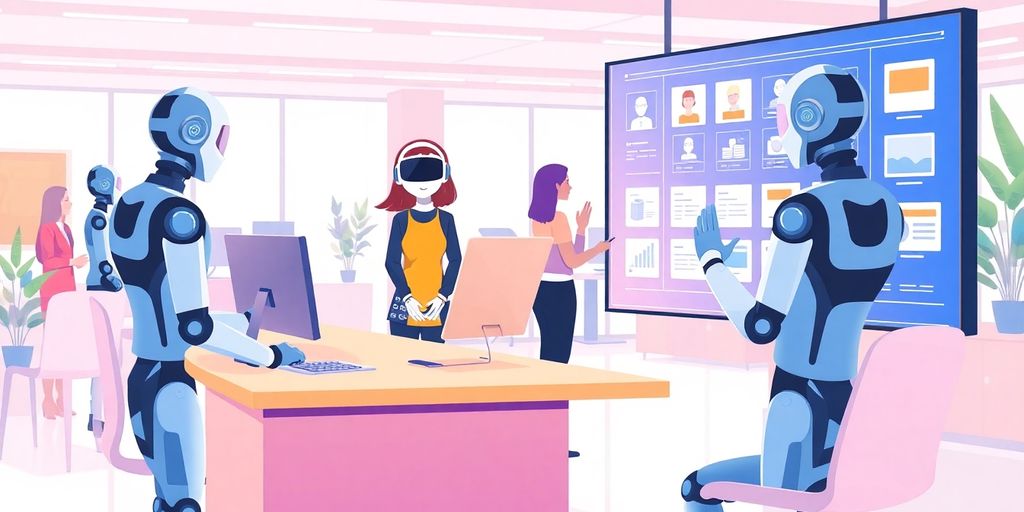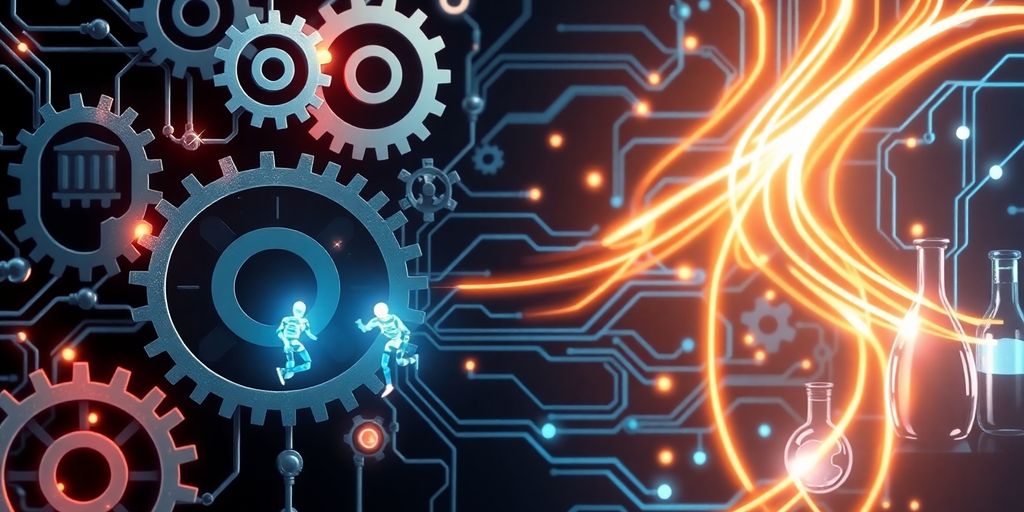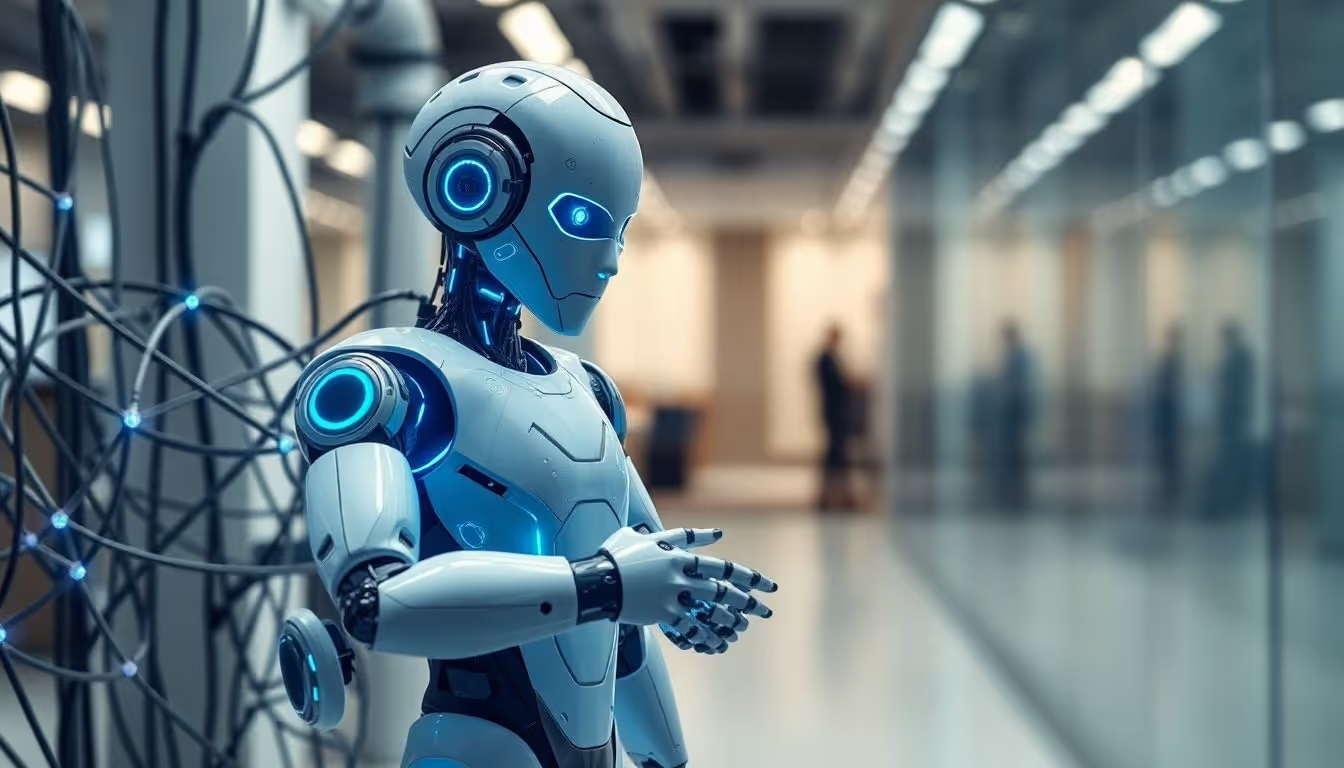Which Business Bottlenecks Can AI Agents Eliminate? More Than You Think
Discover how AI agents eliminate business bottlenecks, from customer service to cybersecurity and R&D. Boost productivity!
AI agents are changing how businesses work, and it's happening faster than many people realize. They're not just for big tech companies anymore. From helping customers to making complex engineering tasks easier, these AI tools are starting to remove a lot of the everyday problems that slow businesses down. We're talking about a real shift in how things get done, and it means companies can do more with less hassle. It's pretty interesting to see how much ground AI agents are covering.
Key Takeaways
AI agents are really good at handling customer questions, making things quicker and more personal.
In engineering and other hands-on jobs, AI agents can help manage tough projects and speed up how things are made.
Using AI agents can make work easier by taking care of boring tasks, letting people focus on more creative stuff.
AI agents are also getting better at finding and stopping online threats, making digital systems safer.
Overall, AI agents can help businesses find new ways to make money and deal with changes in the job market.
Streamlining Customer Service With AI Agents

Customer service is often the first point of contact for customers, and inefficiencies here can lead to frustration and lost business. Fortunately, AI agents are revolutionizing how businesses interact with their clientele. By automating routine tasks and providing personalized support, AI agents are significantly improving customer satisfaction and reducing operational costs.
Automating Routine Inquiries
One of the most immediate benefits of AI agents is their ability to handle routine inquiries. Think about it: how many times does your customer service team answer the same questions about order status, shipping information, or product availability? AI-powered Chatbot can take over these repetitive tasks, freeing up human agents to focus on more complex issues. This not only speeds up response times but also ensures that customers receive consistent and accurate information, 24/7.
Personalizing Customer Interactions
AI agents aren't just about automation; they're also about personalization. By analyzing customer data, AI agents can tailor interactions to individual needs and preferences. This might involve recommending products based on past purchases, offering personalized discounts, or providing support in the customer's preferred language. This level of personalization can significantly improve customer loyalty and drive sales.
Enhancing Support Efficiency
Beyond automation and personalization, AI agents are also enhancing support efficiency in several other ways. They can:
Route inquiries to the appropriate human agent based on the nature of the request.
Provide real-time translation services to support customers in different languages.
Offer self-service options, such as knowledge base articles and FAQs, to help customers resolve issues on their own.
Implementing AI agents for customer service isn't just about cutting costs; it's about providing a better experience for your customers. By automating routine tasks, personalizing interactions, and enhancing support efficiency, AI agents can help you build stronger customer relationships and drive business growth. Embracing AI automation solutions is key to streamlining operations with AI and staying competitive in today's market.
Transforming Engineering and Manual Work Through AI Agents
Engineering and manual labor are on the cusp of a major shift, thanks to the rise of AI automation. It's not just about replacing workers; it's about augmenting their abilities and making processes more efficient. Think about it: fewer errors, faster turnaround times, and more innovative designs. It's a win-win, right?
Orchestrating Complex Tasks
AI agents, especially those powered by models like Chat GPT 4, are becoming adept at managing intricate projects. They can coordinate different aspects of a project, ensuring that everything runs smoothly and on schedule. This is particularly useful in fields like construction or manufacturing, where multiple teams and processes need to be synchronized. It's like having a super-powered project manager that never sleeps.
Accelerating Design and Development
Imagine being able to test hundreds of design iterations in a fraction of the time it currently takes. That's the promise of AI in design and development. Tools like generative ai can quickly create prototypes, simulate performance, and identify potential issues before they become costly problems. This not only speeds up the development cycle but also allows for more experimentation and innovation.
Reducing Repetitive Manual Labor
No one likes doing the same thing over and over again, especially when it's physically demanding. AI agents can take on many of these repetitive tasks, freeing up human workers to focus on more complex and creative work. For example, in manufacturing, robots can handle tasks like welding or assembly, while in agriculture, they can assist with planting and harvesting. This not only improves efficiency but also reduces the risk of injury and burnout among workers. Claude AI is also making strides in this area.
The integration of AI agents into engineering and manual work isn't about replacing humans; it's about creating a more collaborative and efficient work environment. By automating routine tasks and providing powerful tools for design and development, AI can help to unlock new levels of productivity and innovation.
Boosting Productivity and Mitigating Cognitive Load With AI Agents
AI agents are not just about automating tasks; they're about fundamentally changing how we work and think. By taking on the burden of repetitive and mentally taxing activities, these agents free up human workers to focus on higher-level, more creative endeavors. This shift can lead to significant gains in productivity and a reduction in burnout, creating a more engaged and efficient workforce. Let's explore how:
Automating Tedious Assignments
AI agents excel at handling tasks that are repetitive, rule-based, and time-consuming. Think of data entry, report generation, or scheduling meetings. By automating these tedious assignments, AI agents can dramatically reduce the amount of time employees spend on them. This allows individuals to concentrate on more strategic and complex responsibilities that require human intellect and creativity. For example, instead of spending hours compiling data for a report, an AI agent can do it in minutes, allowing the analyst to focus on interpreting the data and developing insights. This is a huge win for accelerating scientific progress.
Freeing Up Human Creativity
One of the most exciting aspects of AI agents is their potential to unlock human creativity. When employees are bogged down by mundane tasks, their cognitive resources are depleted, leaving little room for innovation. By automating these tasks, AI agents free up mental bandwidth, allowing individuals to think more strategically, explore new ideas, and develop creative solutions. This can lead to a more innovative and dynamic work environment, where employees are empowered to contribute their unique perspectives and skills.
Minimizing Burnout in Repetitive Tasks
Repetitive tasks are not only time-consuming but also mentally draining. They can lead to boredom, frustration, and ultimately, burnout. AI agents can alleviate this problem by taking on these tasks, reducing the cognitive load on employees and preventing burnout. This can lead to a happier, healthier, and more productive workforce. Plus, [boosting efficiency with AI tools] is a great way to improve employee retention.
Imagine a world where employees are no longer burdened by mundane tasks, where they are free to focus on their passions and contribute their unique talents. This is the promise of AI agents – a future where work is more engaging, more fulfilling, and more productive.
Fortifying Cybersecurity Defenses With AI Agents
Cybersecurity is a constant arms race, and AI agents are emerging as powerful allies in defending against increasingly sophisticated threats. It's not just about reacting to attacks anymore; it's about anticipating and preventing them. AI agents can analyze vast amounts of data in real-time, identifying patterns and anomalies that would be impossible for human analysts to detect. This proactive approach is crucial in today's threat landscape.
Detecting Malicious Activities
AI agents can continuously monitor network traffic, system logs, and user behavior to identify suspicious activities. They learn what's normal and flag anything that deviates from that baseline. This includes detecting malware infections, unauthorized access attempts, and data exfiltration attempts. The speed and accuracy of AI-powered threat detection can significantly reduce the time it takes to respond to incidents, minimizing damage. For example, AI can help with container security by identifying unusual behavior within containerized applications, a critical aspect of modern cloud infrastructure.
Preventing Fraud and Manipulation
AI agents are proving effective in combating fraud across various industries. They can analyze financial transactions, insurance claims, and other data to identify fraudulent patterns. AI's ability to learn and adapt makes it particularly well-suited for detecting new and evolving fraud schemes. Furthermore, AI agents can help prevent manipulation by identifying and flagging disinformation campaigns and other malicious activities aimed at influencing public opinion. Microsoft recently revealed they've thwarted $4B in fraud using AI, highlighting its effectiveness.
Enhancing Digital Infrastructure Security
AI agents can automate many of the tasks involved in maintaining and securing digital infrastructure. This includes vulnerability scanning, patch management, and security configuration. By automating these tasks, AI agents can reduce the risk of human error and ensure that systems are always up-to-date with the latest security measures. Moreover, AI can assist in third-party evaluators by continuously assessing the security posture of vendors and suppliers, ensuring that they meet required security standards.
The integration of AI into cybersecurity isn't just a technological upgrade; it's a paradigm shift. It allows organizations to move from a reactive to a proactive security posture, enabling them to stay ahead of evolving threats and protect their valuable assets.
Optimizing Economic Impact and Workforce Dynamics With AI Agents
AI agents are poised to reshape the economic landscape and workforce dynamics in ways we're only beginning to understand. It's not just about automation; it's about creating new opportunities and adapting to the changing nature of work.
Identifying New Economic Opportunities
AI agents can analyze vast datasets to pinpoint emerging market trends and unmet needs, leading to the creation of new products, services, and even entirely new industries. This proactive identification of opportunities allows businesses to stay ahead of the curve and capitalize on untapped potential. For example, AI can analyze consumer behavior to predict demand for niche products or identify gaps in existing service offerings. This digital labor is fundamentally changing how businesses innovate and compete.
Navigating Labor Market Shifts
As AI agents take on more routine tasks, the labor market will inevitably shift. It's important to consider the impact of AI powered workflow optimization on employment. This doesn't necessarily mean widespread job losses, but rather a transformation of job roles.
Retraining programs will be crucial to equip workers with the skills needed to collaborate with AI agents.
New roles will emerge focusing on AI agent development, maintenance, and oversight.
Governments and businesses need to work together to ensure a smooth transition for workers affected by automation.
The key is to view AI agents not as replacements for human workers, but as tools that can augment their abilities and free them up to focus on more creative and strategic tasks.
Driving Increased Productivity
AI agents can significantly boost productivity by automating repetitive tasks, optimizing workflows, and providing data-driven insights. This increased efficiency translates to higher profits and economic growth. Consider the following:
Advancing Scientific Research and Development With AI Agents

Artificial intelligence is poised to revolutionize scientific research and development. The ability of Ai agents to process vast datasets, identify patterns, and generate hypotheses at speeds far exceeding human capabilities opens up new frontiers in various scientific disciplines. This section explores how agentic AI is accelerating discovery and innovation.
Accelerating Data Analysis
One of the most immediate impacts of ai applications in science is the acceleration of data analysis. Scientific research often involves the collection and analysis of massive datasets, a task that can be time-consuming and prone to human error. Ai agents can automate this process, quickly identifying relevant information and extracting meaningful insights. This allows researchers to focus on interpreting results and designing new experiments, rather than spending countless hours sifting through data.
Facilitating Breakthrough Discoveries
Ai agents are not just tools for data analysis; they can also play a more active role in the discovery process. By learning from existing data and identifying patterns, these agents can generate novel hypotheses and suggest new avenues of research. This can lead to breakthrough discoveries that might not have been possible through traditional methods. Imagine an agent that can analyze millions of research papers and identify connections between seemingly unrelated fields, leading to new insights and innovations.
Improving Experimental Efficiency
Beyond data analysis and hypothesis generation, Ai agents can also improve the efficiency of experimental design and execution. They can optimize experimental parameters, predict outcomes, and even automate certain aspects of the experimental process. This not only saves time and resources but also reduces the risk of human error, leading to more reliable and reproducible results.
The integration of Ai agents into scientific research is not about replacing human scientists but about augmenting their capabilities. By automating routine tasks and providing new insights, these agents free up researchers to focus on the more creative and strategic aspects of their work, ultimately accelerating the pace of scientific progress.
Enhancing Operational Efficiency Across Industries With AI Agents
Intelligent agents for business are rapidly changing how companies operate, offering solutions to long-standing inefficiencies. These AI systems are not just about automation; they're about creating smarter, more responsive, and more agile organizations. Let's explore how these agents are making a real difference.
Streamlining Supply Chain Management
AI agents are revolutionizing supply chains by providing end-to-end visibility and control. They can predict demand fluctuations, optimize inventory levels, and even negotiate with suppliers. This leads to reduced costs, faster delivery times, and improved customer satisfaction. Consider these benefits:
Reduced inventory holding costs
Minimized stockouts
Improved order accuracy
Faster response to disruptions
Optimizing Resource Allocation
One of the biggest overcoming business challenges with artificial intelligence is figuring out where to best allocate resources. AI agents can analyze vast amounts of data to identify areas where resources are being underutilized or wasted. They can then make recommendations for optimizing allocation, leading to significant cost savings and improved productivity. AI agents are revolutionizing field-based industries by significantly improving safety, optimizing workflows, and boosting overall operational efficiency.
Improving Decision-Making Processes
AI agents can assist in decision-making by providing insights and recommendations based on data analysis. They can identify patterns and trends that humans might miss, leading to better-informed decisions. This is especially valuable in complex situations where there are many factors to consider. Business AI can help with:
Risk assessment
Opportunity identification
Scenario planning
AI agents are not meant to replace human decision-makers, but rather to augment their abilities. By providing data-driven insights, they can help humans make better decisions and achieve better outcomes. This collaborative approach is key to overcoming business challenges AI and maximizing the benefits of AI in the workplace.
Here's a simple example of how intelligent agents business can improve decision-making:
Conclusion
So, we've talked a lot about how AI agents can help businesses. It's pretty clear they can take care of a bunch of those annoying, repetitive tasks that slow everyone down. Think about all the time saved when AI handles things like scheduling or sorting through emails. This means people can focus on the bigger, more creative stuff. It's not about replacing people, but more about giving them tools to do their jobs better and faster. The future looks like a place where AI helps us get more done, leaving us free to tackle the interesting challenges. It's a good deal for everyone, really.
Frequently Asked Questions
What exactly are AI agents?
AI agents are like smart computer programs that can do tasks on their own. They use artificial intelligence to understand what you need, make decisions, and act without constant human help. Think of them as digital helpers that can learn and get better at their jobs over time.
What kinds of tasks can AI agents do?
AI agents can handle many different jobs. For example, they can answer customer questions, manage your calendar, help design new products, or even find problems in computer systems. They are good at doing things that are repetitive or need a lot of data analysis.
Can AI agents really make businesses more efficient?
Yes, AI agents are designed to make things run smoother and faster. They can take over boring, repeated tasks, which frees up human workers to focus on more creative and important work. This can lead to less stress and more interesting jobs for people.
How do AI agents improve customer service?
Absolutely! In customer service, AI agents can answer common questions quickly, help customers with their problems, and even suggest things they might like based on their past choices. This makes customers happier and helps companies handle more requests without needing more human staff.
Are AI agents useful for protecting against cyber threats?
AI agents are a big help in cybersecurity. They can watch for strange activities in computer networks, spot potential attacks before they happen, and even help stop fraud. They work around the clock to keep digital systems safe.
Will AI agents take away people's jobs?
While AI agents can take on some jobs, they also create new ones. People will be needed to build, manage, and fix these AI systems. The goal isn't to replace people entirely, but to change how we work, making jobs more about guiding AI and solving complex problems.








